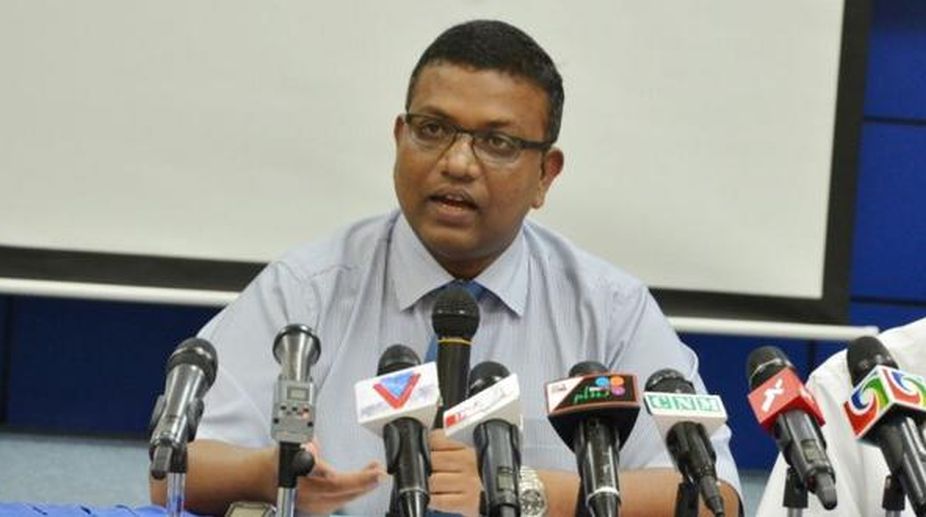Born in Male in 1970, Ahmed Mohamed has been the Maldives Ambassador to India since January 2015. Prior to this, he has served his country in various capacities, including as Minister of Economic Development. In this interview to Ashok Tuteja, he speaks candidly about India-Maldives relations and attempts by China to increase its footprints in the archipelago.
Excerpts:
Advertisement
Maldives is facing a prolonged period of political uncertainty, with the Opposition on the warpath with the establishment. Don’t you think the situation is a cause for concern?
Despite many calls by the government for dialogue, the opposition has refused to be engaged. When there is no dialogue there will be little opportunity to comprise. There will be little opportunity to address concerns. It is the collective effort of all concerned that will bring in solutions.
Let me also dwell a little bit more on trying to present to you the ground realities of the Maldives. One needs to understand the ground realities of the Maldives to assess and deliver a fair judgement on what is happening in the Maldives.
Ever since the modern democratic system of governance which came in to effect in August 2008, we have had the same state of affairs. A difficult and inflexible situation.
Firstly, the political situation in the Maldives is in a highly polarised state. Why do I say that? The Maldives has a population of just over 3,40,000 people. The electorate comprises of all above 18 years of age. The population above 18 years is close to 75 per cent of the total population. Among the eligible voters over 55 per cent is a registered member of a political party.
Where do we find such a high proportion of politically active population? There are five main political parties. A small population with such a high proportion of political activism and polarisation leading to inflexibilities. But I would not call this an uncertain situation. It is not only now, there have been difficult periods in the past as well. But we have ~ by which I mean the Maldivians have ~ found solutions to overcome them. Of course, for a young and evolving democracy there is scope for more that can be done.
What we have been telling the international community and other bilateral partners is that all parties need to participate in a national dialogue. The solutions also need to be homegrown. What had worked in one country may not necessarily be as effective in another country. The culture, the attitude, the understanding, the acceptance, the environment: All these factors matter.
If one wants to help, do not offer prescriptive solutions, but be engaged, hold our hands, and help us strengthen our democratic institutions. But if a segment of both the domestic and international community continues to rock the boat, the time it takes to reach a calm and safer harbour will be longer.
Do you see any role for India in the current crisis?
Well, as I said earlier, we will welcome efforts by our bilateral parners to be engaged with us. We would like our bilateral partners to understand the ground realities of the Maldives. We would like our partners to assist us to develop and implement homegrown solutions and not prescriptive solutions. We would also like our partners to assist us in building institutional and human resource capacity.
China seems to be wooing Maldives in a big way as part of its ‘string of pearls’ policy to encircle India. Your comment?
Well, I must say that we go by the foreign policy of the Maldives. We would like to be engaged with all our bilateral partners. We would like to enjoy cordial and friendly relations will all of them.
However, little realised and little acknowledged in public domain is the fact that the Maldives and India enjoy a special relation. The Maldives practises and follows an India First Policy when it comes to security and peace in the India Ocean.
Based on this and India being one of closest neighbours of the Maldives, the relationship we have with India has special dimension to it. It is more interlinked. It is more engaging.
And if your question was with regard to the various development projects for which we have secured financing from China, then the response is India being the closest in terms of proximity and in terms of the special foreign policy focus which I just mentioned, India is in a much better position to provide concessional financing for our developing needs and has more wider scope and space to further enhance and further strengthen the special relationship.
Anti-India sentiments appear to be rising in Maldives. What is the possible reason?
It is certainly not a fact. I would categorically deny that. But when the voices of disgruntled politicians are perceived or portrayed as the reality then such a question is quite possible. The various lies that have been brought to the forefront through controlled social engineering tactics which has been projected as the voice of the dissent are fallacies and nothing but a ruse to create chaos and get sympathy. A projection of a mirage, and that is all.
How do you look at the South Asian satellite launched by India recently?
I would have to quote Prime Minister H.E. Modi here, “Sabka saath. Sabka vikas”. Well, as the President of Maldives, H.E. Abdulla Yameen said at the launching ceremony of the South Asia Satellite, “We are grateful for the people and government of India for providing a very special gift to the South Asia region”. We believe that the South Asia Satellite will help to improve the lives of the people of South Asia. We now have the benefit of using it to improve people-to-people linkages and enhance capacity and quality of services such as telecommunication, telemedicine, tele-education, mapping of natural resources and disaster management support.
Do you think the SAARC has failed to achieve its true potential as a regional grouping due to India-Pakistan rivalry?
The SAARC, from its inception, has had difficulties in achieving the intended goals of that organisation. The Maldives strongly believes that SAARC member-states must work towards the common good of all. The Maldives will remain committed to work with all our South Asian neighbours towards the greater good of all.
Maldives is considered an attractive tourist destination by Indians.At the same time, many Indians with limited budgets believe it is quite costly to go to Maldives. How do you propose to attract middle-class Indian travellers to Maldives for tourism?
We are witnessing an increase of Indian tourist arrivals to the Maldives year on year. We would like to encourage more Indian tourists’ visit to the Maldives. We have different varieties of accommodation facilities in the Maldives. There are resorts, liveaboards, hotels and guesthouses. There is need to increase connectivity from northern cities of India as well.
Can you throw light on defence cooperation between India and Maldives, especially in the fight against terrorism and maritime security?
We hold regular exercises jointly both on land and at sea. We receive Indian assistance for the work of the National Counter Terrorism Centre.











